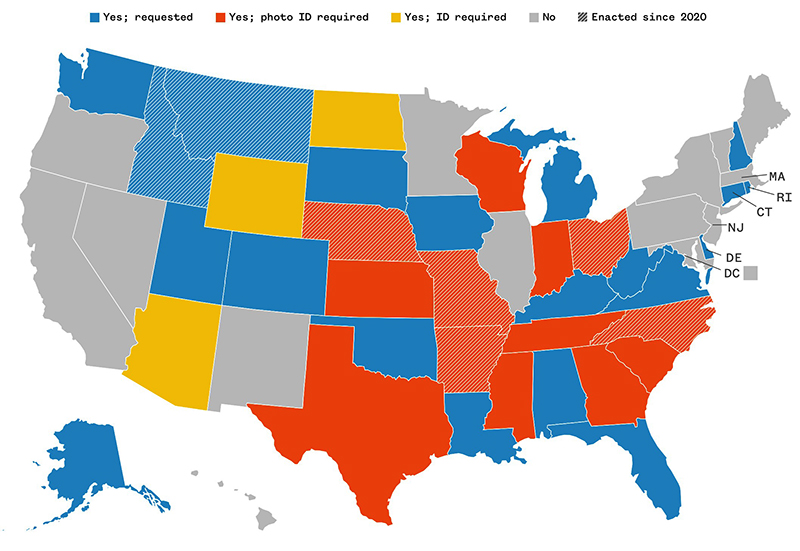

As tens of millions of people go to vote tomorrow, some of them are going to be surprised when
they are asked for photo ID in order to vote. Many will say: "When I voted in 2020 I didn't need
one. Why now?" The answer will be: "Because the state legislature passed a new law after the 2020
election." Eight states have done that, namely Arkansas, Idaho, Missouri, Montana, Nebraska, North
Carolina, Ohio and Wyoming. All in all, now 36 states, including nearly all red states, require some
form of ID to vote. Fourteen states and D.C. do not require ID. Signing in and swearing under
penalty of perjury that you are an eligible voter in that state is sufficient there. Here is a
map
showing where ID is requested, required, or not and where the law has changed since 2020.

The link to the map above also gives the detailed requirements for each state. States where ID is requested generally have a provision that a voter who doesn't have ID at the time of voting gets a provisional ballot. If the voter then shows up with ID within a certain period of time after the election, the vote is counted; otherwise it is discarded. In some states, the voter has to jump through more hoops to validate a provisional ballot. In Arizona, North Dakota, and Wyoming, ID is needed but it need not be photo ID. Often a utility bill with the voter's address on it will do.
In most other countries, some form of ID is needed to vote and the whole procedure is not controversial. In the U.S., the ID laws are controversial because it is primarily poor people who don't have a car or a driver's license who don't have any acceptable form of ID and these people would generally vote for Democrats. So the voting ID laws are specifically intended to disenfranchise people who strongly skew Democratic. It is a partisan thing. In some states, the DMV issues voter ID cards for free, but often there are still obstacles in the path of anyone wanting one. For example they may need to present an official birth certificate (which costs $23 in Texas). In many cases, to get a birth certificate, you have to show up in person with some proof of who you are and then only during limited hours in the middle of the day (when some people can't get off from work). (V)